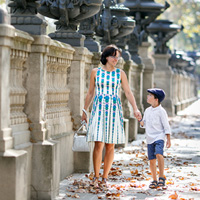Christmas in Spain
Summary: Learn how people celebrate Christmas and the New Year in Spain - traditions, food, church, gift exchange and more.
The holiday season in Spain is a vibrant tapestry of age-old traditions and festive celebrations. For expats and digital nomads experiencing their first Christmas and New Year's in Spain, the period is marked by a series of unique customs, delicious foods, and joyous events that span the entire month of December and into January.
Christmas and New Year's Traditions in Spain
In Spain, Christmas is not just a single day of celebration but a series of events that unfold throughout the month. The festivities officially begin on December 8th with the Feast of the Immaculate Conception and continue until the Epiphany on January 6th. Spanish people typically celebrate with family gatherings, special meals, and religious services. Unlike some countries where Christmas is the climax of the holiday season, in Spain, the festivities extend to the arrival of the Three Kings on January 6th, which is as significant as Christmas Day for many.
Celebrating the Holidays
During the holiday season, Spaniards enjoy a variety of public celebrations and private gatherings. Christmas markets pop up in town squares, offering handcrafted gifts, decorations, and seasonal treats. Nativity scenes, known as 'Belénes', are a common sight, with some towns holding exhibitions or competitions for the most elaborate displays. Carol singing, or 'villancicos', is another cherished tradition, with groups often performing in public spaces.
The Festive Figures
While Santa Claus, or 'Papá Noel', has become more popular in recent years, the traditional bearers of gifts in Spain are the Three Kings, or 'Los Reyes Magos'. Children write letters to the Kings instead of Santa, eagerly awaiting their arrival on the night of January 5th, when parades, or 'cabalgatas', are held in their honor. Gifts are typically exchanged on January 6th, the day of the Epiphany.
Gift-Giving and Shopping
Gift-giving is an integral part of the holiday season, with family and friends exchanging presents. Traditional gifts include toys for children, while adults might receive clothing, books, or artisanal goods. Shopping for gifts is often done at Christmas markets or in the festively decorated shopping districts of cities and towns.
Traditional Foods and Desserts
Food plays a central role in Spanish holiday celebrations. Christmas Eve, known as 'Nochebuena', is particularly significant, with families gathering for a large meal that might include seafood, 'jamón ibérico' (Iberian ham), and 'turrón', a type of nougat. On New Year's Eve, or 'Nochevieja', it is customary to eat twelve grapes at midnight, one for each chime of the clock, to bring good luck for each month of the coming year.
Christmas Eve and Christmas Day
Christmas Eve is often spent at home with family, culminating in a midnight mass called 'La Misa del Gallo' (The Rooster's Mass). Christmas Day is more relaxed, with a leisurely lunch that can last for several hours. While not everyone attends church, many do, either on Christmas Eve or Christmas Day morning.
Destinations for Holiday Cheer
Certain towns and neighborhoods are renowned for their Christmas spirit. Madrid's Plaza Mayor transforms into a bustling Christmas market, while Barcelona's Fira de Santa Llúcia is a go-to destination for holiday wares. In Andalusia, the city of Málaga is famous for its spectacular light displays, and in the Basque Country, the Olentzero, a mythical coal miner who brings gifts, is celebrated with parades and festivities.
As the holiday season unfolds in Spain, expats and digital nomads will find themselves immersed in a festive atmosphere that is both enchanting and heartwarming. From the twinkling lights of Christmas markets to the joyous parades of the Three Kings, Spain offers a holiday experience that is rich in tradition and full of celebration. Whether you're savoring a slice of turrón, joining in a chorus of villancicos, or toasting to the New Year with grapes at midnight, your first holiday season in Spain is sure to be an unforgettable adventure.
About the Author
 Betsy Burlingame is the Founder and President of Expat Exchange and is one of the Founders of Digital Nomad Exchange. She launched Expat Exchange in 1997 as her Master's thesis project at NYU. Prior to Expat Exchange, Betsy worked at AT&T in International
and Mass Market Marketing. She graduated from Ohio Wesleyan University
with a BA in International Business and German.
Betsy Burlingame is the Founder and President of Expat Exchange and is one of the Founders of Digital Nomad Exchange. She launched Expat Exchange in 1997 as her Master's thesis project at NYU. Prior to Expat Exchange, Betsy worked at AT&T in International
and Mass Market Marketing. She graduated from Ohio Wesleyan University
with a BA in International Business and German.
Some of Betsy's articles include 12 Best Places to Live in Portugal, 7 Best Places to Live in Panama and 12 Things to Know Before Moving to the Dominican Republic. Betsy loves to travel and spend time with her family. Connect with Betsy on LinkedIn.
Additional Information:
- Spain Guide
- Healthcare & Health Insurance in Spain
- Members Talk about Healthcare & Health Insurance in Spain
- Best Places to Live in Spain
- Real Estate in Spain
- Guide to Real Estate in Spain
- Pros & Cons of Living in Spain
- Cost of Living in Spain
- Moving to Spain with a Pet
- Mental Health Care in Spain
- Do I need Health Insurance When Moving to Spain?
- Best Places to Ski in Spain
- 2025 Guide to Living in Spain
- Pros and Cons of Living in Spain 2025
- 2025 Guide to Moving to Spain




